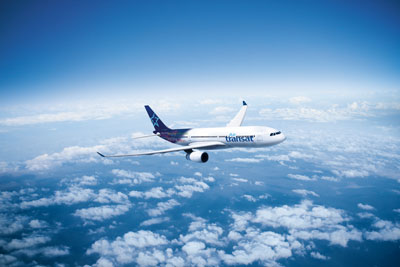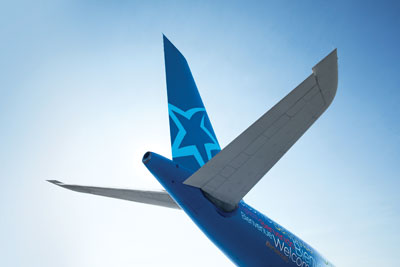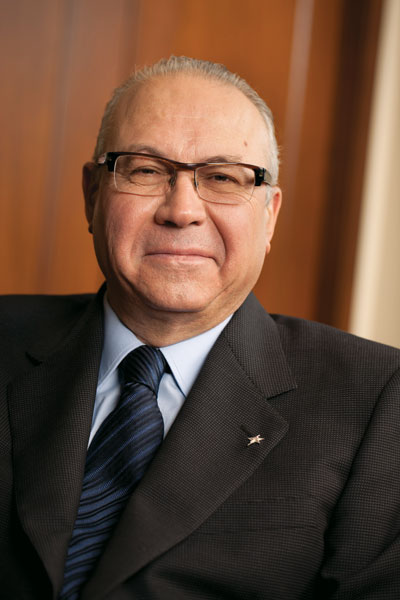
Features
Operations
Transitioning at Transat
After a couple of bumpy quarters, travel company Transat A.T. of Montreal
March 22, 2012 By Brian Dunn
After a couple of bumpy quarters, travel company Transat A.T. of Montreal, hopes to turn its fortunes around this year through more cost-cutting measures to strengthen operations and return to profitability.
 |
|
| Air Transat plans to offer 157 flights a week between Canada and Europe this summer, including 57 between Quebec and the continent. Photo: Air Transat |
The firm is reducing overhead costs in Canada and France, abolished 143 positions last fall for an annual cost savings of $11 million, “optimized” its IT systems, and outsourced aircraft to third parties. Of the 143 cut positions, 80 were in Quebec, but about 20 of them had been vacated. Some 60 people in Montreal lost their jobs and about 55 in Western Canada.
The efforts are expected to add $20 million to $25 million in margins next year, $35 million to $40 million in 2013 and $50 million in 2014. “The problem was at the level of execution and now we’ve brought in new people and new ideas,” CEO and co-founder Jean-Marc Eustache told analysts after reporting its disappointing fourth-quarter and year-end results. He warned that the return to profitability will be long and bumpy and that fiscal 2012 will be “challenging.” He says the current situation can’t continue and adds Transat may have to shed some leased aircraft if they can’t make money.
The fourth quarter was hit by increased competition, mainly from WestJet Vacations, Air Canada Vacations and Sunwing Vacations, the economic slowdown in Europe, restructuring costs and rising fuel prices. Eustache said Transat is revitalizing its hotel network to reduce costs and offer “differentiated” products and upgrading its fleet with more entertainment and new seating. These initiatives will offset downward price pressures and improve margins.
The first A330 upgrade is scheduled for completion in April for $4 million and five more will follow over the next 12 months. Transat said quarterly revenue was helped by a 15.3 per cent rise in transatlantic travellers, partly offset by a 14.2 per cent decline in European revenue. Capacity was down two per cent in the winter season, including an eight per cent drop in the first quarter.
Transat posted adjusted (excluding special items) earnings of $10.1 million, or 27 cents a share, in the fourth quarter ended Oct. 31 compared to $47.7 million, or $1.25 a share, a year earlier, on revenue of $809.9 million, up from $778.6 million.
Including $16.5 million of restructuring costs, a $4.9-million fuel hedging loss and other special items, the quarter showed a $4.5-million loss compared to earnings of $52.4 million or $1.37 a share. For the full year, Transat had a final loss (including special items) of $12.2 million compared to earnings of $65.6 million, or $1.73 a share, a year earlier.
The results generated mixed reviews from industry analysts. Despite the poor results, Laurentian Bank Securities analyst Ben Vendittelli remains a strong Transat supporter, pointing out, “long term we still like the story and continue to believe the business model remains viable, though in need of some restructuring. We believe Transat can return to higher profitability.”
Cameron Doerksen of National Bank Financial saw a few positive signs, but remains cautious. He was pleased Air Transat reduced its winter capacity by two per cent instead of increasing it four per cent as previously planned. “The overcapacity in the sector remains a problem, especially in the face of another difficult winter. Transat’s activities in Europe (this summer) could also face a difficult period, given the economic context.”
Doerksen also suggests that given Transat’s proven track record of profitability over the past few years, it could become a takeover target. However, he adds the list of potential suitors would be very small due to foreign ownership restrictions.
While Transat revealed some details of its strategic initiatives, there were elements of its turnaround efforts that it couldn’t discuss for competitive reasons, notes Kevin Chang of CIBC. “Management refuses to discuss how it intends to convince hotel operators to reduce their prices,” he says. “In addition, I’m not convinced that the changes Transat is making will be enough to increase demand. I applaud management for recognizing a need for a new strategy, but there is a risk of setting deadlines which could affect its financial position, particularly in the current economic context.”
Benoît Poirier of Desjardins Securities also saw some favourable organizational changes, but would have liked to have had more details from management. “There are still a lot of unanswered questions,” notes Poirier. “While the (restructuring) plan should help profitability, I think ultimately, the improvement of margins will depend on a balance between the supply and demand of the industry. And that’s something I don’t see happening in the short or medium term.”
Food for thought
Looking ahead, Air Transat plans to offer 157 flights a week between Canada and Europe this summer, including 57 between Quebec and the continent. But the carrier isn’t adding any new destinations and will be dropping one – Vienna. However, it will be increasing frequencies to Italy and Portugal and is introducing a holiday package based on “slow food.” Launched in 1986 as an alternative to fast food, slow food strives to preserve traditional and regional cuisine and encourages farming of plants, seeds and livestock characteristic of the local ecosystem.
 |
|
| For 2011, Transat had a final loss (including special items) of $12.2 million compared to earnings of $65.6 million, or $1.73 a share, a year earlier. Photo: Air Transat |
Vienna was offered as a destination for the past three years and was popular among Canadian travellers going to Europe, but inbound traffic from the Austrian capital never caught on, according to the company. And with just one weekly flight, it couldn’t compete with Air Canada and other European carriers who often offered daily service, it added. Instead, Transat has opted to beef up service to more popular destinations such as Italy and Portugal. It will add another flight each week to Rome for a total of six flights a week from Montreal during the peak summer travel period. And unlike last summer, the two weekly flights to Lisbon, including one that will also serve Porto, will not be shared with Toronto.
The total number of seats from Canada to Europe will be increased by five per cent, compared to a 15 per cent increase last summer from the previous year. The difference is due to economic conditions in Europe, which are forcing Transat to be more cautious this summer, according to Transat spokesperson Debbie Cabana. Interestingly, demand by Europeans for travel to Canada is ahead of last year’s pace, while demand by Canadians heading across the “pond” is equally high, Cabana says.
Transat is offering slow food packages based on Italian gastronomy whereby weekly packages will feature local products in Tuscany, Venice and Sicily. The offer will include food and wine tastings and visits to wine-growing regions.
Istanbul, last year’s new destination, is getting more ink in Transat’s travel brochures by offering a holiday in the Turkish city with time in Athens or the seaside resorts of Antalya or Bodrum. Similar options are being offered in France, Spain and Portugal, where stays in Lisbon can be combined with time in Porto.
Transat is also upgrading the cabins of its Airbus A330s for more passenger comfort, although exact details won’t be revealed until just before the start of the busy summer travel season in June.
Several nominations have also been made over the past few months. Chief operating officer Nelson Gentiletti and Michael DiLollo, president of Transat Tours Canada, both long-serving executives, have stepped down as part of the senior management shuffle. Allen Graham, CEO of the Air Transit unit, becomes president of Transat Canada. Eustache, taking full charge at the operating level, says Transat is being split into three units – Transat Canada, Transat France and Transat International.
“Allen Graham will be my partner,” he says. “André de Montigny will head Transat International. Transat intends to sharpen inventory management, adjust prices more rapidly, improve load factors and speed up decision-making and management execution.
A green future
On the environmental front, Air Transat has become the first airline to be certified green by the World Green Aviation Council of Mississauga, Ont. The certification, Fly-360-Green, consists of a comprehensive system for rating the design, innovation and operation of highly sustainable airlines and airports.

|
|
| Transat CEO and co-founder Jean-Marc Eustache says the company is revitalizing its hotel network to reduce costs and offer “differentiated” products, and upgrading its fleet with more entertainment and new seating. Photo: Air Transat
|
“We are extremely proud to have obtained this certification,” says Graham. “Our airline has implemented a great many measures and programs geared toward environmental protection and sustainable development, including a fuel management program to lower CO2 emissions. Over the past few years, we have adopted measures to save water and energy, promote recycling and reduce waste. And we are continuing our group effort with employees to keep on improving our environmental performance.”
The Fly-360-Green certification is intended to provide the airline industry and airports with a concise framework for identifying and implementing collaborative and measurable green aviation designs, innovations, and operations solutions.
Using the 55 different environmental initiatives in the three main categories found in the Airline Environmental Management Framework (Daily Operational Activities, Corporate Environmental Management Practices, and Corporate Policies/Strategic Planning), airlines and airports can qualify for one of three certification levels: A-class (over 110 points), B-class (100-109 points) and C-class (90-99 points) for airlines; and A-class (over 60 points), B-class (50-59 points) and C-class (40-49 points) for airports.
The World Green Aviation Council consists of member airlines and airports from around the globe dedicated to a simple mission: foster an international standard for sustainable aviation through cutting-edge technological advancements, while also taking into consideration aviation’s absolute emissions, which are constantly on the rise despite various pro-environmental actions taken by stakeholders.